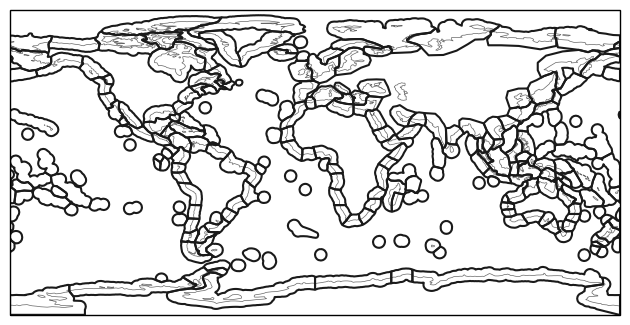Using regionmask with intake¶
Regions from geopandas shapefiles can be pre-defined in a yaml file, which can be
easily shared. This relies on intake_geopandas and accepts regionmask_kwargs,
which are passed to regionmask.from_geopandas.
If you set use_fsspec=True and use simplecache:: in the url, the shapefile is
cached locally.
You need to install intake_geopandas, which combines geopandas and intake, see https://intake.readthedocs.io/en/latest/.
In [1]: import intake_geopandas
In [2]: import intake
# open a pre-defined remote or local catalog yaml file
In [3]: url = 'https://raw.githubusercontent.com/regionmask/regionmask/master/data/regions_remote_catalog.yaml'
In [4]: cat = intake.open_catalog(url)
# access data from remote source
In [5]: meow_regions = cat.MEOW.read()
In [6]: print(meow_regions)
<regionmask.Regions>
Name: unnamed
Regions:
0 r0 Region0
1 r1 Region1
2 r2 Region2
3 r3 Region3
4 r4 Region4
.. ... ...
227 r227 Region227
228 r228 Region228
229 r229 Region229
230 r230 Region230
231 r231 Region231
[232 regions]
In [7]: meow_regions.plot(add_label=False)
Out[7]: <cartopy.mpl.geoaxes.GeoAxesSubplot at 0x7f4d100d0c50>

Find more such pre-defined regions in remote_climate_data.
Build your own catalog¶
To create a catalog we use the syntax described in intake. Let’s explore the Marine Ecoregions Of the World (MEOW) data set, which is a biogeographic classification of the world’s coasts and shelves.
In [8]: with open('regions_my_local_catalog.yml', 'w') as f:
...: f.write("""
...: plugins:
...: source:
...: - module: intake_geopandas
...: sources:
...: MEOW:
...: description: MEOW for regionmask and cache
...: driver: intake_geopandas.regionmask.RegionmaskSource
...: args:
...: urlpath: simplecache::http://maps.tnc.org/files/shp/MEOW-TNC.zip
...: use_fsspec: true # optional for caching
...: storage_options: # optional for caching
...: simplecache:
...: same_names: true
...: cache_storage: cache
...: regionmask_kwargs:
...: names: ECOREGION
...: abbrevs: _from_name
...: source: http://maps.tnc.org
...: numbers: ECO_CODE_X
...: name: MEOW
...: """)
...:
In [9]: cat = intake.open_catalog('regions_my_local_catalog.yml')
In [10]: meow_regions = cat.MEOW.read()
In [11]: print(meow_regions)
<regionmask.Regions>
Name: MEOW
Source: http://maps.tnc.org
Regions:
1.0 NorGre North Greenland
2.0 NorandEasIce North and East Iceland
3.0 EasGreShe East Greenland Shelf
4.0 WesGreShe West Greenland Shelf
5.0 NorGraBanSouLab Northern Grand Banks - Southern Labrador
... ... ...
228.0 AmuBelSea Amundsen/Bellingshausen Sea
229.0 RosSea Ross Sea
230.0 BouandAntIsl Bounty and Antipodes Islands
231.0 CamIsl Campbell Island
232.0 AucIsl Auckland Island
[232 regions]
Because simplecache:: was added to the urlpath and use_fsspec=True, the zip file was
downloaded to the folder specified in cache_storage. The file access is now local.
In [12]: import os
In [13]: assert os.path.exists('cache/MEOW-TNC.zip')